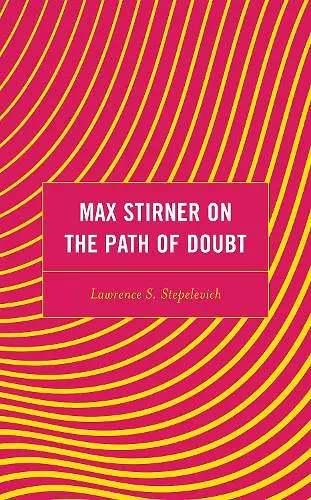Max Stirner on the Path of Doubt
Format:Paperback
Publisher:Bloomsbury Publishing PLC
Published:24th Aug '22
Currently unavailable, and unfortunately no date known when it will be back
This paperback is available in another edition too:
- Hardback£90.00(9781793636881)

Max Stirner on the Path of Doubt examines Stirner's incisive criticism of his contemporaries during the period from the death of Hegel, in 1831, to the 1848 German Revolution. Stirner's work, mainly the Ego and His Own, considered each of the major figures within that German school known as “The Young Hegelians.” Lawrence S. Stepelevich argues that for Stirner, they were but “pious atheists,” and their common revolutionary ideology concealed an ancient religious ground – which Stirner set about to reveal. The central doctrine of this school, that Mankind was its own Savior, was initiated in 1835 by the theologian, David F. Strauss's in his Life of Jesus , and it progressed with August von Cieszkowski's mystical recasting of history, followed by Bruno Bauer's absolute atheism and Ludwig Feuerbach's statement that “Man is God.” This soon found reflection in the “Sacred History of Mankind” declared by Moses Hess. Within a decade, the result was the secular reformulation of this theological ideology into the “Scientific Socialism” of Karl Marx and Frederick Engels. Although linked to it, Max Stirner was the most relentless and feared critic of this school. His work, never out of print, but largely ignored by academics, has inspired countless “individualists” set upon rejecting any form of religious or political “causes,” and finding Stirner's assertion that he had “set his cause upon nothing” took this as their own cause.
“This is an important and needed book which brings a lifetime of first rate scholarship to bear on Max Stirner’s thought, as well as the significant thinkers, critics and commentators who were active in his generation, just after the death of Hegel. While offering a well-painted picture of Stirner himself, it also astutely suggests the contemporary relevance of many of Stirner's preoccupations. The style is intelligent, very informed and informative. It evidences much impressive erudition, but it wears its scholarly learning lightly. The result is a very readable text, engaging, and illuminating, as well as being full of significant touches of wit and irony. Very warmly recommended.” -- William Desmond, Katholieke Universiteit Leuven
In this highly engaging study, Lawrence Stepelevich makes the counterintuitive but highly compelling argument that Max Stirner is the legitimate heir and standard-bearer of Hegel’s dialectical logic. Stirner’s signature work from 1844, The Ego and His Own, has been dismissed by establishment Hegelians, satirized by Marx and Engels, and called "absurd" by the likes of Lukács, Derrida, and Habermas. And yet, as Stepelevich shows, there is good reason to hold that it is Stirner, and not the usual crew of Hegel-epigones, who represents the genuine fulfillment of Hegel’s philosophy and the true maturation of spirit in history (beyond the various forms of unhappy, adolescent consciousness). Even if it is accurate to characterize Stirner’s thinking as “nihilistic,” Stepelevich shows that Stirner’s “nihilism” is a surprisingly productive or creative kind which anticipates various strands of postmodern thought while at the same time avoiding the self-undermining strategies of contemporary postmodernism as commonly deployed. This book, a model of historically-sensitive philosophy and philosophically-astute history, will inform, provoke, and invigorate the thinking of experts and beginners alike. -- Michael Baur, Fordham University
A lively, witty, and erudite defense of Max Stirner from one of the most respected authorities on his thought. Stepelevich sets Stirner’s work in the context of Hegel and the Young Hegelians and makes a bold and intelligent case for its enduring significance. All readers interested in the aftermath of Hegel and the development of nineteenth-century thought will learn much from this informative and thought-provoking book. -- Stephen Houlgate, University of Warwick
In Max Stirner on the Path of Doubt, Stepelevich unfolds a picture of the much misunderstood, and much ignored, German philosopher Max Stirner (1806–56). Stepelevich attempts to align Stirner as the natural inheritor and fulfiller of Hegel's dialectical logic. What is distinctive about Stirner, as Stepelevich argues in the introduction, is that he was from the beginning "neither an 'Old Hegelian' dedicated to the exhaustive autopsy of the Hegelian corpus nor a 'Young Hegelian' bent on employing it to a further purpose.".... This book will be of great interest in those working on the history of German idealism. Highly recommended. * Choice Reviews *
ISBN: 9781793636904
Dimensions: 229mm x 151mm x 15mm
Weight: 367g
226 pages